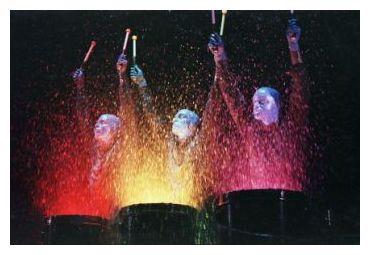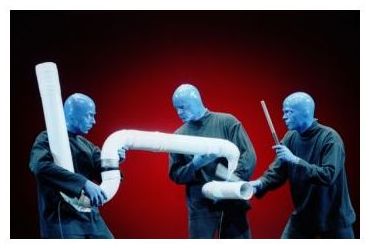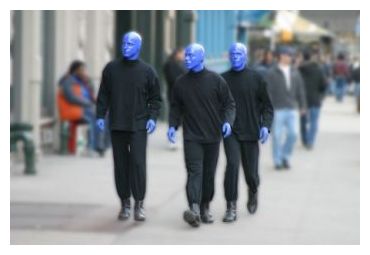|
|
feature interview
The Blue Man GroupLast updated 05/10/05 In popular culture today it's very easy to forget that theatre is meant to make us think about ourselves, about where we are, both individually and as a community. In trying to find the next big thing, the next blockbuster, the next Broadway smash, most audiences have become used to the idea that performance is all sizzle and no substance. But not everybody feels that way. The Blue Man Group has been creating challenging and exciting work for almost twenty years now, work that says something about where we've been, where we are and where we're going as a cultural entity. Formed in the late eighties by a group of three friends, the Blue Man Group was designed to challenge some of the notions people had at the time, not just with theatre, but with art in general. Michael Quinn, artistic director of the group explains "The founders of the company grew up in the 60s and 70s and when they were ready to be part of a movement and be part of something big, there wasn't really alot happening in the 80s. Everything became disposable."
But to say that the Blue Men are about turtlenecks and bald heads is missing the point. The Blue Men represent an ideal of exploration, of curiosity and a connection to the primal self within all of us. And that connection to the primal self is at the root of the Blue Men's appeal. Michael explains "we don't see it as putting a mask on, we see it as taking a mask off. When the makeup goes on, we want these characters to be the essence of a human being, the idea of an innocent peeled down to the most vulnerable, exposed, emotionally available space. It's the everyman because it's what's common in all of us." "If you look at the Blue Men, they come out of the audience to tell the people the essence of what they're feeling right now."
The Complex Rock Tour is a prime example of the Blue Men putting their own spin on modern rituals. Having found themselves with a CD of music, the question of whether the music could stand up in a concert setting became the kind of challenge that the group were all excited to take. "The thing about theatre is that people go to be entertained but it's generally very subdued, very staid, and it's generally very passive," says Michael. "When they go to a rock concert people want to participate, they want to experience it and they want to be rocked! We had this body of music that embodies our art, so our goal was to show the Blue Man perspective on the rock concert genre. Our goal was to make fun of rock concerts, but at the same time have the best rock experience you could ever have." "We had this body of music that embodies our art, so our goal was to show the Blue Man perspective on the rock concert genre."The prototype for what would become The Complex Rock Tour took place at the Area II festival, a touring festival featuring a variety of djs, David Bowie, Moby, and the Blue Men. And as with all festival type tours, it wasn't without its challenges. You can imagine how hot it gets out in the summer sun wearing a turtleneck. But heat issues aside, it worked. The group was able to capture the spirit of the show and build on it in such a way as to present the Blue Man ideal in a new type of environment. When they went out on the road again under their own name the next year they had honed the show into a slick rock 'n' roll spectacle that received rave reviews and was successful in its mission of both rocking out and spreading the Blue Man ideal of modern ritual. Didn't catch it when it came to your town? Don't worry, the tour also resulted in a DVD of the show which was certified Platinum only seven months after it's release.
The Blue Man Group opens its performance in Toronto at the Panasonic Theatre in June of 2005. Tickets are available through Ticketmaster at http://www.ticketmaster.ca or by calling (416) 870-8000
read an interview with Arms Full of Sound read an interview with ambient pioneer Steve Roach
read an interview with Richard Baker, Scott M2 and Jamie Todd read an interview with Mercurine read an interview with Numina
|


 Surrounded by this disposability the Blue Men decided to make something with a little more
staying power. Taking a fresh and innovative approach to theatre, the Blue Men's early
performances in New York (including the notable "Funeral for the 80s") started a buzz and
in 1991 they found themselves with a residency at the Astor Place Theatre. Within a few
years shows had opened in Boston, Chicago, Las Vegas and Berlin. A show in Toronto opens
in June. And it doesn't stop at theatrical performances. The Blue Men have also worked
on three successful ad campaigns in association with Intel computers, had a number of
performances on The Tonight Show and have undertaken two tours, one as part of the Area II
festival, the other under their own name. In addition to their live work, they've also
released two CDs of music, "Audio" and more recently "The Complex" featuring music written
and performed by the group using a variety of instruments of their own making such as the
tubulum, air poles and the shaker gong. Indeed with all of this activity, it's no surprise
that the black turtlenecks, bald heads and blue paint that make up the groups uniform have
become culturally ubiquitous.
Surrounded by this disposability the Blue Men decided to make something with a little more
staying power. Taking a fresh and innovative approach to theatre, the Blue Men's early
performances in New York (including the notable "Funeral for the 80s") started a buzz and
in 1991 they found themselves with a residency at the Astor Place Theatre. Within a few
years shows had opened in Boston, Chicago, Las Vegas and Berlin. A show in Toronto opens
in June. And it doesn't stop at theatrical performances. The Blue Men have also worked
on three successful ad campaigns in association with Intel computers, had a number of
performances on The Tonight Show and have undertaken two tours, one as part of the Area II
festival, the other under their own name. In addition to their live work, they've also
released two CDs of music, "Audio" and more recently "The Complex" featuring music written
and performed by the group using a variety of instruments of their own making such as the
tubulum, air poles and the shaker gong. Indeed with all of this activity, it's no surprise
that the black turtlenecks, bald heads and blue paint that make up the groups uniform have
become culturally ubiquitous.
 Making a connection with the everyman is at the heart of what the Blue Men do. Granted,
they might be a little more imaginative with their use of cereal, and they can probably
make better use of that PVC tubing you've got lying around the backyard, but the basis of
what they do is grounded in our existing culture. They aren't creating something alien,
instead they're part of the same culture that we are. Michael elaborates on their appeal.
"Theatre at its most base is a collection of people who have chosen somebody from amongst
them to go up and tell the story of the group. If you look at the Blue Men, they come out
of the audience to tell the people the essence of what they're feeling right now. They're
part of the community." Within that community, the Blue Men are very much aware of the
processes and ceremonies that make up modern life. "In discussions, we use the idea of
the Blue Men as shaman," points out Michael, "as ritual leaders. We want to explore the
rituals of our modern society and see if there are any connections with our ancient
rituals. Rock concerts, sporting events and theatre? They're the rituals of our modern
society."
Making a connection with the everyman is at the heart of what the Blue Men do. Granted,
they might be a little more imaginative with their use of cereal, and they can probably
make better use of that PVC tubing you've got lying around the backyard, but the basis of
what they do is grounded in our existing culture. They aren't creating something alien,
instead they're part of the same culture that we are. Michael elaborates on their appeal.
"Theatre at its most base is a collection of people who have chosen somebody from amongst
them to go up and tell the story of the group. If you look at the Blue Men, they come out
of the audience to tell the people the essence of what they're feeling right now. They're
part of the community." Within that community, the Blue Men are very much aware of the
processes and ceremonies that make up modern life. "In discussions, we use the idea of
the Blue Men as shaman," points out Michael, "as ritual leaders. We want to explore the
rituals of our modern society and see if there are any connections with our ancient
rituals. Rock concerts, sporting events and theatre? They're the rituals of our modern
society."
 Obviously the Blue Man Group has come a long way from those early performances on the
streets of New York. All of their success has resulted in a company of over 500 employees,
a company run with the same ideas of community and artistic integrity that inspired the
founding three members all those years ago. Plans for more shows and new ways to present
their own style of theatre are constantly in the works, along with a number of other
opportunities. Michael points out "from the get go, we've looked at ourselves as an
artistic creative organization and not as a show oriented company.
We want to take the ideas of the show and the themes of our work and take it to other
places. We scored a television series, we do film scoring, we're working on children's
books, we're working on corporate workshops, all these things we're trying to work towards
our brand becoming more recognized and understood as standing for creativity, innovation,
community, and modern ritual. And if all of these things help us become a genre or
movement, then the scope of what we do becomes limitless."
Obviously the Blue Man Group has come a long way from those early performances on the
streets of New York. All of their success has resulted in a company of over 500 employees,
a company run with the same ideas of community and artistic integrity that inspired the
founding three members all those years ago. Plans for more shows and new ways to present
their own style of theatre are constantly in the works, along with a number of other
opportunities. Michael points out "from the get go, we've looked at ourselves as an
artistic creative organization and not as a show oriented company.
We want to take the ideas of the show and the themes of our work and take it to other
places. We scored a television series, we do film scoring, we're working on children's
books, we're working on corporate workshops, all these things we're trying to work towards
our brand becoming more recognized and understood as standing for creativity, innovation,
community, and modern ritual. And if all of these things help us become a genre or
movement, then the scope of what we do becomes limitless."